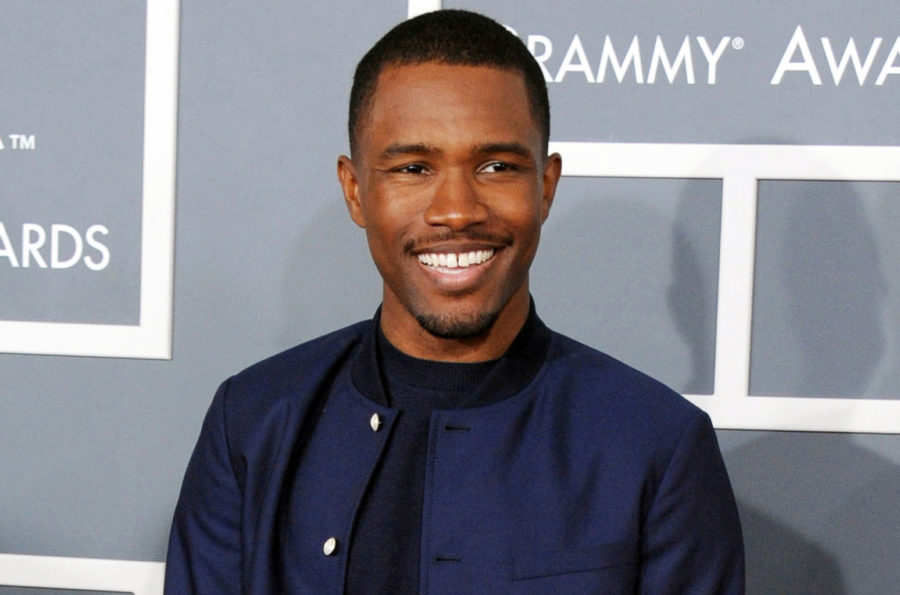Frank Ocean: Nostalgia for the Moment
April 6, 2017
Frank Ocean is an artist that lives in remembrances of the past. His first album is, not surprisingly, titled Nostalgia, Ultra. Throughout his first two albums, Ocean has used nostalgia, a longing for the past, to discover deep revelations about himself. With a combination of deep introspection and surreal fantasy, Ocean has created a successful formula for his music.
For example, on Nostalgia, Ultra, standout hit “There Will be Tears” croons about Ocean’s absentee father and how he wishes that his father would have warned him about the impending abandonment. Throughout Ultra, Ocean uses samples of Coldplay, MGMT, Mr. Hudson, The Eagles, and Radiohead to provide the backdrop for his poignant and wistful lyrics. On his next album, Channel Orange, he delves even deeper into his love life with a few fantastical twists. He refers to unrequited love as a bad religion and likens his relationship with a woman to the war-torn country of Sierra Leone. The music also shifts on this album, instead of sampled melodies, Ocean uses grandiose and complex musical arrangements to soundtrack his experiences; Coldplay and Radiohead are replaced by instrumentals that are seemingly modeled after the stylings of Prince, Marvin Gaye, Stevie Wonder, and D’Angelo.
A day after the release of the album, Frank Ocean revealed to the public that he was bisexual. This brought on an outpouring of support from various publications, celebrities, and the public at large, and, in 24 hours, Frank Ocean went from relative obscurity to an icon in the hip hop and LGBT communities. After his Grammy win, Ocean promised his fans that his next album was in the works; however, he quietly disappeared. He deleted his Twitter, Instagram, and Facebook accounts while falling off the radar of the paparazzi. After four long years of false starts and endless rumors, Frank Ocean finally delivered his third album titled Blond. It is an album that can be described as a minimalist portrait of Frank Ocean as a person. Through 17 tracks, he uses his patented use of nostalgia differently than he ever has before; in this album, he creates a soundscape where time stops. Ambient music is described by Brian Eno, an innovator in the genre, as “able to accommodate many levels of listening attention without enforcing one in particular; it must be as ignorable as it is interesting.” Blonde is the epitome of this idea through simple piano notes, pronounced guitars, watery synths, punchy drums, pitch shifting, gorgeous strings, and beautiful vocal arrangements. As a result, Ocean creates an atmosphere as amorphous and interesting as his lyrics.
On opening track “Nikes,” he shifts his vocals to an almost obnoxious level as if he is inhaling helium. Throughout the song, co-producer Malay Ho plays a fluid and pretty mellotron. Ocean sings of materialism, but also recalls heavier subjects including the murder of Trayvon Martin, the taboos of race, absentee parents, drug trafficking, love, religion, hedonism, and infidelity. In five minutes Ocean covers all of these topics without any hesitation through his stream-of-consciousness style.
On tracks like “Ivy,” ”Nights,” and “Godspeed,” he tells the story of past love: how they met, their eventual breakup, and how ultimately he forgives him/her and wishes them well. Throughout the album, Frank tells stories in a nonlinear way, until he finally reaches an emotional climax on “Siegfried.” On this track, he sings about his doubts and his lack of relations to and with others. He also delivers the most jaw-dropping lyric about depression I have ever heard: “I’ve tried hell/It’s a loop/and the other side of the loop is a loop.”
My favorite track of the album is “Close to You.” It is a song in which Ocean sings to a former lover through a vocoder, a device that digitizes the voice. This song reminds me of Kanye West’s album 808s and Heartbreak. Other standout tracks like “Self Control,” “Skyline To,” and “Solo” use minimal instrumentals to place greater focus to some of the most beautiful vocal arrangements I have ever heard.
My favorite moment of this album has to be André 3000’s excellent verse on “Solo,” where he raps at a rapid pace about his disillusionment with the world, specifically within the hip hop community. “3 Stacks” ponders whether or not he has worked too hard at his craft while other rappers were using ghostwriters to design their biggest hits. He also shows his hatred for the gender politics of this era, apologizing to women if he seems insensitive because of lack of knowledge on being a woman in America. Another feat of this album is the many guest features and collaborations. In addition to André 3000, Ocean collaborated with some of the most popular musicians in the world: Beyoncé and Pharrell on “Pink and White,” Kendrick Lamar and Tyler for “Skyline To,” Radiohead member Jonny Greenwood on multiple tracks, and some foreign musicians like Christophe Chassol on “Skyline To,” Yung Lean on “Godspeed,” and KOHH on “Nikes.” These features are essential yet hidden throughout the album and, at times, appear almost undetectable. He made sure to work with some of the best musicians in the world, but treated them more like instruments rather than main features. The collaborators provide support to the record, but they don’t outshine Ocean.
In 17 tracks, Frank Ocean quietly crosses genres from dream pop to indie rock, from soul to gospel, from ambient music to R&B, from hip hop to electronica from art rock to whatever the heck “Pretty Sweet” is, back to gospel, and finally back to hip hop. You almost don’t notice this genre-hopping, in addition to the hidden details in the album’s instrumentals, buried underneath the mix. Blonde is an album that forces you to slow down, something that simply doesn’t happen these days, and for that I thank Frank Ocean not just for this most recent addition, but for all of his albums that develop wonderful and adventurous music.


